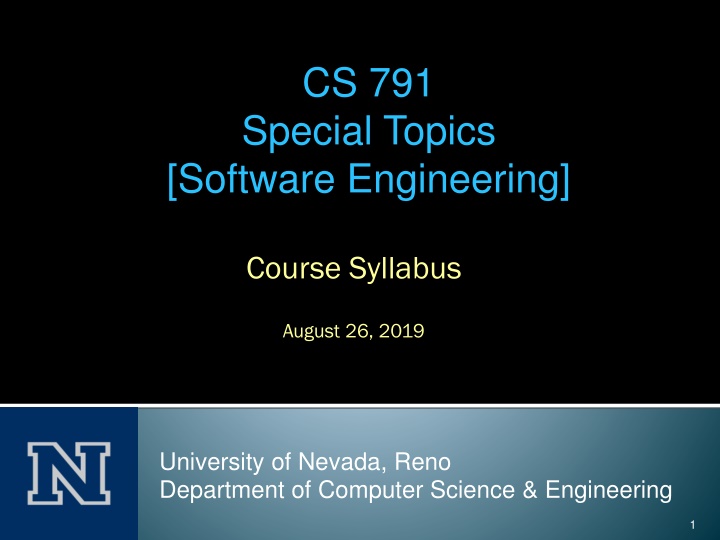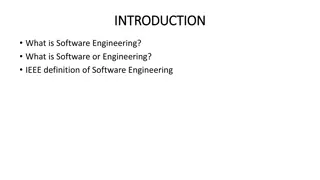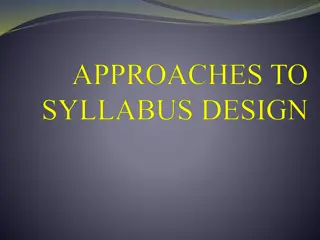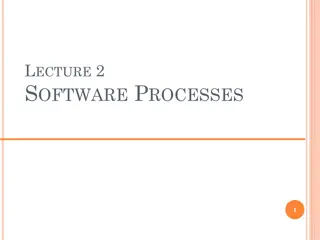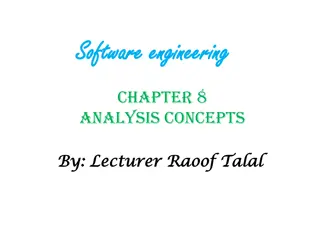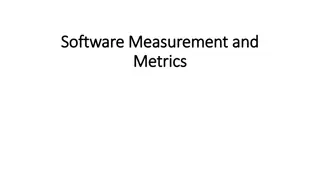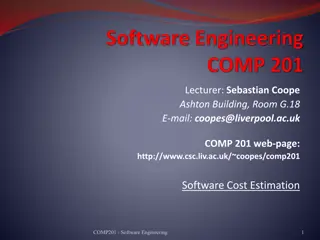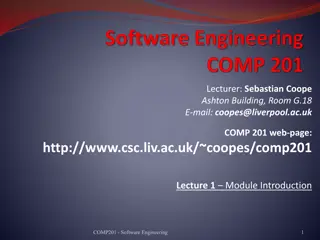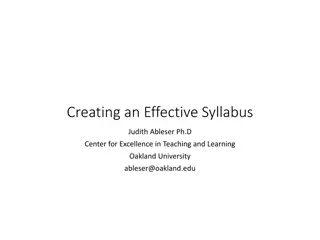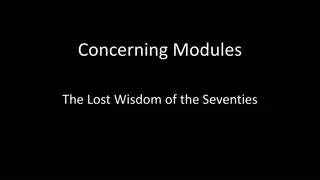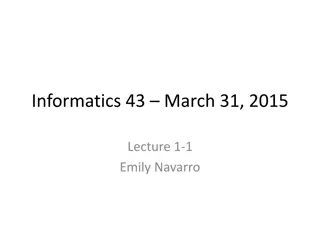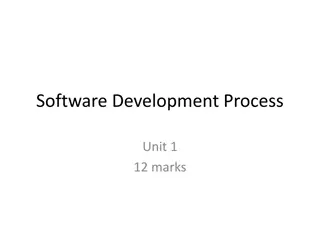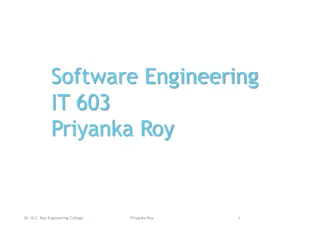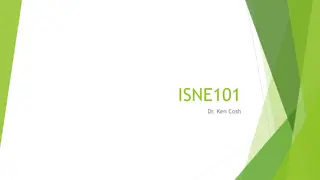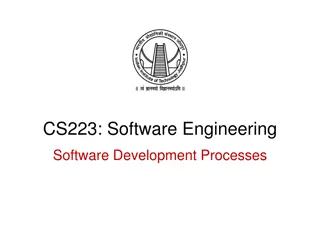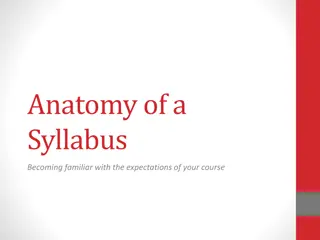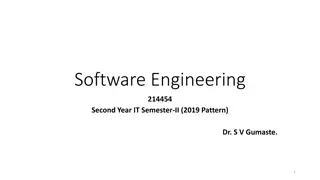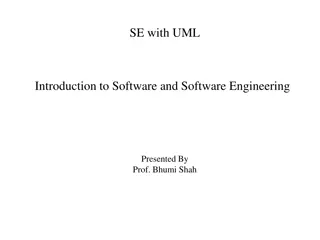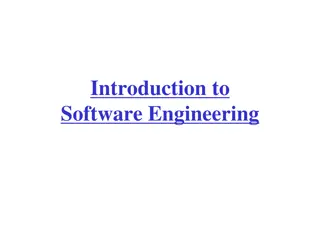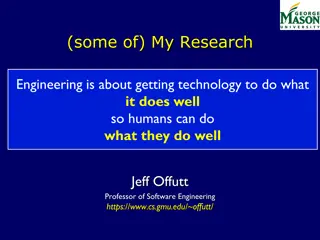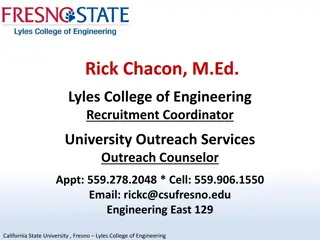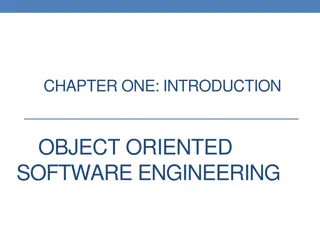CS 791 Software Engineering Syllabus
This course at the University of Nevada, Reno delves into software engineering research topics, processes, requirements analysis, design, and more. With a focus on broadening students' understanding, it includes project preparation, paper writing, and presentation skills development. Instructor Sergiu Dascalu is an experienced professional with a Ph.D. from Dalhousie University.
Download Presentation

Please find below an Image/Link to download the presentation.
The content on the website is provided AS IS for your information and personal use only. It may not be sold, licensed, or shared on other websites without obtaining consent from the author.If you encounter any issues during the download, it is possible that the publisher has removed the file from their server.
You are allowed to download the files provided on this website for personal or commercial use, subject to the condition that they are used lawfully. All files are the property of their respective owners.
The content on the website is provided AS IS for your information and personal use only. It may not be sold, licensed, or shared on other websites without obtaining consent from the author.
E N D
Presentation Transcript
CS 791 Special Topics [Software Engineering] Course Syllabus August 26, 2019 University of Nevada, Reno Department of Computer Science & Engineering 1
The Instructor The Students The Course The Texts Grading Scheme & Grading Scale Policies Tentative Schedule What s Next? 2
Sergiu Dascalu Room SEM-236 Telephone 784-4613 E-mail dascalus@cse.unr.edu Web-site www.cse.unr.edu/~dascalus Office hours: Tuesdays 10:00 am - 12:00 pm 3
Sergiu Dascalu PhD, Dalhousie U., Halifax, NS, Canada, 2001 Teaching and research at UNR, 2002-present (software engineering, HCI) Teaching and research at Dalhousie University, 1993-2001 (software engineering focus) Teaching and research at the University Politehnica Bucharest, Romania, 1984-1993 (RT embedded systems focus) Consultant for software development companies in Canada and Romania 4
Registered as of today: CS 791 Software Engineering (SE): 14 students Prerequisites: Very good SE background & preparation, communication skills, and programming skills 5
Classroom: SEM-257, MW 4:00 - 5:15 pm Outline: This course will explore research topics on software engineering, encompassing principles, methods, and tools. Areas of research include software processes, requirements analysis and specification, design, prototyping, implementation, validation and verification, software modeling, model driven engineering, integrated development environments, and case studies. 6
Outline [contd]: The course will allow the students to broaden their knowledge of software engineering concepts, principles, techniques and tools, study relevant research publications in the field, prepare and present a quality software engineering project and, based on this project, write a paper that could be submitted to a scientific conference. 7
Required texts: Research papers and book chapters indicated later by the instructor Possibly, a reference book that will be selected by September 4, 2019 8
Recommended textbook: Ian Sommerville, Software Engineering, 10th edition, Addison-Wesley, 2015. Lecture notes: Presentations by the instructor Notes you take in the classroom Additional material (documentation, tutorials, etc.) that will be indicated later by the instructor 9
The course website: www.cse.unr.edu/~dascalus/se2019.html IEEE s Digital Library, via www.ieee.org ACM Digital Library, via www.acm.org The Software Engineering Institute, at Carnegie Mellon University, www.sei.cmu.edu IEEE Computer Society s Technical Council on Software Engineering, www.tcse.org The Object Management Group, www.omg.com 10
Designing and implementing a software application using SE principles, process activities, and tools Writing a project-based course paper In-class student presentations on: SE research papers, tools, methods or case studies SE class project 11
Tentative (subject to modifications): - Assignments & project parts - Midterm exam - Course paper - Presentations/paper discussions - Class participation [50%] [25%] [15%] [ 7%] [ 3%] 12
Notes on grading: For grade A: at least 90% overall, at least 90% in class participation and at least 70% in test To pass the course: at least 50% overall, at least 50% in project parts and assignments, and at least 50% in course paper There are no make-up tests or homework in this course Note that poor class participation can significantly decrease your overall grade [well beyond 3%] 13
Numerical-letter grade correspondence A 90 -100 A- 87 - 89 B+ 84 - 86 B 80 - 83 B- 77 - 79 C+ 74 - 76 C 70 - 73 C- 67 - 69 D+ 64 - 66 D 60 - 63 D- 50 - 59 F < 50 [maximum 100] 14
Late submission policy: No late days for presentations, demos, and test Maximum 2 late days per project deliverable Each late day penalized with 10% No subdivision of late days (e.g. in hours) Example: a 90/100 worth project deliverable gets 81/100 if one day late (90*0.9 = 81) or 72/100 if two days late (90*0.8 = 72) 15
Graduate Student Learning Outcomes (G-SLOs) Our graduates will have: An ability to apply engineering and computer science research and theory to advance the art, science, and practice of the discipline. An ability to design and conduct experiments as well as to analyze, interpret, apply, and disseminate the data. An understanding of research methodology. 16
Cheating, plagiarism or otherwise obtaining grades under false pretenses constitute academic dishonesty according to the code of this university. Academic dishonesty will not be tolerated and penalties can include filing a final grade of "F"; reducing the student's final course grade one or two full grade points; awarding a failing mark on the coursework in question; or requiring the student to retake or resubmit the coursework. For more details, see the University of Nevada, Reno General Catalog. 17
Disability statement: Any student with a disability needing academic adjustments or accommodations is requested to speak with us, the instructors, or the Disability Resource Center (Pennington Achievement Center Suite 230) as soon as possible to arrange for appropriate accommodations This course may leverage 3rd party web/multimedia content, if you experience any issues accessing this content, please notify your instructor. 18
Statement for Academic Success Services: Your student fees cover usage of the Math Center (775) 784-4433, Tutoring Center (775) 784-6801, and University Writing Center (775) 784-6030. These centers support your classroom learning; it is your responsibility to take advantage of their services. Keep in mind that seeking help outside of class is the sign of a responsible and successful student. 19
The University Math Center (UMC) is focused on helping students with mathematical and statistical concepts. While mathematics is used extensively in engineering, the UMC does not have the resources to help students with engineering courses. Engineering students are encouraged to use the UMC for help in their math classes, and they are welcome to use its computer lab and study area any time regardless of course. However, UMC tutors cannot answer questions regarding engineering courses. 20
Surreptitious or covert video-taping of class or unauthorized audio recording of class is prohibited by law and by Board of Regents policy. This class may be videotaped or audio recorded only with the written permission of the instructor. In order to accommodate students with disabilities, some students may have been given permission to record class lectures and discussions. Therefore, students should understand that their comments during class may be recorded. 21
The University of Nevada, Reno is committed to providing a safe learning and work environment for all. If you believe you have experienced discrimination, sexual harassment, sexual assault, domestic/dating violence, or stalking, whether on or off campus, or need information related to immigration concerns, please contact the University's Equal Opportunity & Title IX office at 775-784-1547. Resources and interim measures are available to assist you. For more information, please visit the Equal Opportunity and Title IX page. 22
There will be a good deal of interaction and class/group activity in this course. For that reason, students are expected to be engaged in, and focused on, the classroom discussion and/or activities. In addition, everyone involved in this class is expected to act in a professional manner, and interact with her or his peers with that same professional demeanor, which precludes rude or inappropriate behavior. 23
Illness: If you are sick or have a health-related reason for not attending class, let the instructor know as soon as possible of this situation Course/Policy Modification: The instructor reserves the right to add to, and/or modify any of the above policies as needed to maintain an appropriate and effective educational atmosphere in the classroom and the laboratories. In the case that this occurs, all students will be notified in advance of the implementation of the new and/or modified policy 24
See also the PDF version of the CS 791 SE syllabus (written as a UNR syllabus template), available online on the course website, entry Lecture 1. 25
Course objectives: Extension of software engineering knowledge Study and presentation of relevant research work Development of a good quality software project Overall improvement of research skills Writing a paper that can be submitted to a scientific conference or journal 26
Week # Dates (T, R) Contents 1 Aug 26, 28 Course syllabus, Students introduction 2 Sep -, 04 Students introduction, A#1 given 3 Sep 09, 11 Lectures Lectures 4 Sep 16, 18 A#2 given, A#1 due Project teams/individuals decided by Sep 18 Student presentations (round 1) 5 Sep 23, 25 A#3 given, A#2 due 6 Sep 30, Oct 02 Student presentations (round 1) Student presentations (round 1), Lecture 7 Oct 07, 09 A#4 given, A#3 due 27
Lectures 8 Oct 14, 16 P#1 given, A#4 due Lectures P#2 given, P#1 due 9 Oct 21, 23 10 Oct 28, 30 Lectures Lecture, Student presentations (round 2) P#3 given, P#2 due 11 Nov 04, 06 12 Nov - , 13 Student presentations (round 2) 13 Nov 18, 20 Student presentations (round 2) 14 Nov 25, 27 Midterm exam on November 25, 2019, Lecture Project demos P#3 due 15 Dec 02, 04 Project demos 16 Dec 09, -- Papers due Wednesday December 18 28
My intentions & expectations: Provide guidance in the complex SE spectrum Help you be better prepared for research and development in SE Guide you in writing an SE research paper Hope that you will both work hard and enjoy your work in this course 29
Your intentions & expectations: Why do you take the course? What is your experience so far with SE? In what ways do you think this course could help your professional development? What topics are you interested in? What suggestions do you have for the instructor? Are you ready for the ride? 30
Students introduction: be prepared to talk about 6 minutes about yourself. Have 4 to 8 slides that describe: A bit of your background. Briefly, your professional evolution, experience, and current status Your best accomplishments so far (recommended: 2 or 3) Your main interests in SE What interests you most at this time regarding your graduate studies: Exploring the background for a thesis or dissertation Developing an interactive software application or tool Writing a research paper Something else (indicate what) Optionally, interesting fact(s) that are not normally on your resume Anything else you might want to add, within the bounds of 6 minutes 31
